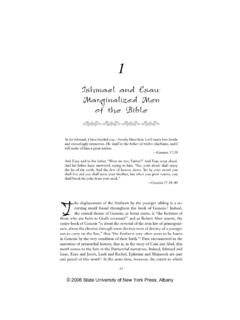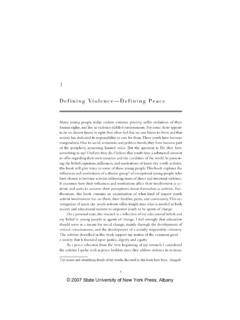Transcription of ENVIRONMENTAL ETHICS AND INTRINSIC VALUE
1 In this chapter, different philosophies containing models of environmentalethics, which are based on some form of the INTRINSIC VALUE of the nonhuman,will be examined. The authors discussed are three of the more prominent envi-ronmental ethicists1who base their approach on the INTRINSIC VALUE of the non-human realm to various degrees. These authors will be presented in increasingorder of radicalism. Tom Regan argues for the INTRINSIC VALUE only of higheranimals, excluding INTRINSIC VALUE from plants and lower animals. Thusalthough he argues for the INTRINSIC VALUE of the nonhuman, this VALUE is morerestricted in scope than in the other two authors. J. Baird Callicott, followingAldo Leopold, argues for the land ethic, which attributes INTRINSIC VALUE moreholistically to species, habitats, ecosystems, and the like. INTRINSIC VALUE isthereby given a larger scope than in Regan and also a different locus of VALUE ,in wholes rather than individuals.
2 Finally, Holmes Rolston III argues for theintrinsic VALUE of much the same set as Callicott, but is more radical in his the-ory of VALUE . Callicott argues from a Humean position of (human) moral sen-timents in which INTRINSIC VALUE is projected to a nonhuman set of , like Regan, argues that VALUE must be completely beyond any humanbasis but, unlike Regan, has a much larger set, which includes more than justhigher animals. It also embraces other species, ecosystems, and the is the most radically ecocentric ENVIRONMENTAL ethicist of the three andmarks the biggest break with modern Western VALUE theory and subsequent section will detail criticisms of non-anthropocentric valuetheories from within the literature of ENVIRONMENTAL ETHICS . Bryan Norton has1 ENVIRONMENTAL ETHICS AND INTRINSIC VALUE |1| 2004 State University of New York Press, Albanydeveloped a sustained critique of inherent VALUE theories in environmentalethics, and argues that ENVIRONMENTAL ETHICS can be established with anthro-pocentrically based will use certain terms frequently in what follows and some may not be will attempt to define them at the outset.
3 Anthropocentric means any phi-losophy or theory of VALUE that makes a special case of humans and is orientedtoward humans. A theory of VALUE that is anthropocentric bases VALUE in somedistinctive human capacity, whether this is a distinctively human species dif-ference or essence, a psychological faculty or capacity, a subjective state ofwhich only humans are capable, or some other factor exclusive to humans. Itstands in contrast with animal rights theories , which extend the scope of valueto animals; ecocentric theories , which are centered in the environment; andbiocentric theories , which are centered in life. Ecocentric means a philosophyor theory of VALUE that is rooted in the ecology. Subjectivity means both thosephilosophies grounded in the human subject and their theories of VALUE . It isa subset of anthropocentric, as the subject is generally human. However, somehave argued that animals are like human subjects in the relevant respects, anddiffer only in degree.
4 Thus animals can be the subjects of a life of a sort. Sub-jective theories are usually contrasted with objective theories , which groundvalue in the theories combine subjects and objects by locat-ing VALUE in a relation of an object to a , there are foundational and metaphysical theories of VALUE in which VALUE goes beyond the subject-object distinction and is more primitive, basic, or VALUE is frequently defined idiosyncratically, contextually, or, forsome authors, using only a partial definition, at least in comparison to otherauthors. The dictionary definition of INTRINSIC is belonging to the essentialnature or constitution of a thing. 4It is sometimes equated with inherent, that is, the essential character of something. 5 Other authors distinguishinherent from INTRINSIC VALUE , notably C. I. Lewis. INTRINSIC VALUE is usuallycontrasted with instrumental, extrinsic, or use VALUE .
5 Often the INTRINSIC -instrumental distinction is coextensive with the ends-means distinction, butnot always. Similarly, it is usually coextensive with the distinction of actions,subjects, or things that are valuable for their own sake by contrast with thosevaluable for the sake of something else. These terms will be scrutinized inmore detail in the locus of VALUE (or rights) is the instance, level, or locale of suchvalue including the type in which VALUE is , locus of valuecould include places for example, habitats and landscapes. It can also includeanalytically distinct relations ( , ends and means), if VALUE is located in oneor the other. Nominalistic theories argue that VALUE can only be located inindividuals. Holistic theories , by contrast, place VALUE in larger, often abstractloci, such as species, ecosystems, and the biosphere.
6 Bearers of value7(or|2|John Dewey and ENVIRONMENTAL Philosophy 2004 State University of New York Press, Albanyrights) are individual instances or tokens of a locus of VALUE ( , one individ-ual in a nominalistic theory, or one species in a more holistic theory). Locusand bearer can be the same ( , an individual), but need not be. Moral considerability, 8like moral standing, means those bearers ofvalue that are entitled to receive moral respect or consideration. Only bearerswith moral standing can be due moral responsibility by moral agents. Moralresponsibility does not extend to bearers of values without moral standing, forexample, purely instrumental s Animal RightsTom Regan is perhaps the earliest author of the three we are considering onthe subject of INTRINSIC VALUE in ENVIRONMENTAL ETHICS and in many respects heis a pioneer. One of his early articles follows Peter Singer in calling for rightsfor nonhuman Singer, Regan wishes to extend what have pre-viously been considered human rights to nonhuman animals.
7 Unlike Singer,he does not base rights on a utilitarian view but on a novel argument fromintrinsic VALUE as the basis of rights. He is critical of the utilitarian view as tooanthropocentric and thus as unable to provide a sufficient justification for therights of nonhuman argues in The Nature and Possibility of an EnvironmentalEthic, 10that the traditional ETHICS of Western philosophy is inadequate toprotect animals, species, and the environment. Because it is anthropocentric,grounded in specifically human capacities and attributes, it cannot provide anadequate basis or defense of animal rights or the preservation of species. Atbest, he argues, anthropocentric ETHICS can only produce a management ethic of how to best manage the balance of nature for human cannot meetwhat Regan considers to be the first condition for an ENVIRONMENTAL ethic,which is that an ENVIRONMENTAL ethic must hold that there are nonhumanbeings which have moral standing.
8 12 Regan considers a number of what aredeemed to be anthropocentric theories and argues that they are identifies one such theory as the contract view. A contract is a set ofrules that humans agree to abide by. As animals cannot understand such con-tracts, they are excluded from them and thus from moral is another case of a subjective state confined to humans,although it might be argued that it is a unique human ability, rather than asubjective state. Such arguments are, following Singer, speciesist, in that theyconfine moral consideration to one species. Similarly, the argument of Kantthat mistreating animals may corrupt human character14is judged inade-quate as well as anthropocentric. It fails to grant moral standing to argues that arguments for confining VALUE to human subjectsfrom or based on consciousness are kinship arguments, which argue that|3| ENVIRONMENTAL ETHICS and INTRINSIC VALUE 2004 State University of New York Press, Albanyfrom the idea that beings resembling humans in the quite fundamental wayof being conscious.
9 [that they] have moral standing. 15 Kinship theoriesare larger than management theories , that is, the theories that result in a man-agement ethic. They include nonhuman species, but only on the basis ofresemblance to humans. Thus kinship theories extend moral standing beyondhumans, but are still subtly anthropocentric, as they only grant moral stand-ing to animals that resemble specifically different human capacities. Reganargues that kinship arguments fail to meet a second condition of an environ-mental ethic. This condition is that An ENVIRONMENTAL ethic must hold thatthe class of those beings which have moral standing includes but is larger thanthe class of conscious beings that is, all conscious beings and some noncon-scious beings must be held to have moral standing. 16 Neither the kinship northe management ethic can constitute a valid ecological ETHICS as they fail toinclude some nonconscious beings as morally considerable.
10 The same failingis also a flaw of the many forms of utilitarianism. Although several utilitari-ans have argued for moral standing for animals, notably Singer, they are notradical enough for Regan. Since they confine moral considerability to sen-tient beings, they exclude a great many contrasts kinship arguments with anthropocentric argumentsthat exclude animals, even those similar to humans. One of these argumentsis what he calls the interest argument, which states that only consciousbeings can have interests and thus moral standing. The interest argument isone variety of the argument from unique human abilities or capacities. Since,as I noted earlier, moral standing is required for moral obligation, there can beno obligation toward those beings who are not conscious in such argues specifically that if what is benefited or harmed by what is given or denied them is in their interest, it is coextensive with those havingmoral standing, and then it is larger than the class of those having conscious-ness.








